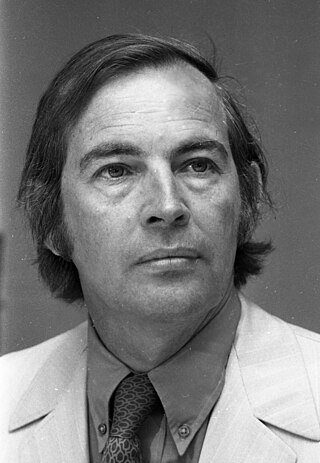
Christiaan Neethling Barnard was a South African cardiac surgeon who performed the world's first human-to-human heart transplant operation. On 3 December 1967, Barnard transplanted the heart of accident victim Denise Darvall into the chest of 54-year-old Louis Washkansky who regained full consciousness and was able to talk easily with his wife, before dying eighteen days later of pneumonia, largely brought on by the anti-rejection drugs that suppressed his immune system. Barnard had told Mr. and Mrs. Washkansky that the operation had an 80% chance of success, an assessment which has been criticised as misleading. Barnard's second transplant patient, Philip Blaiberg, whose operation was performed at the beginning of 1968, returned home from the hospital and lived for a year and a half.
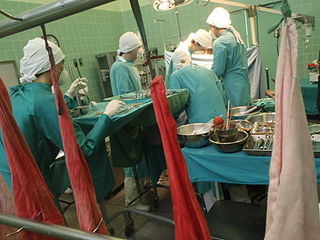
Organ transplantation is a medical procedure in which an organ is removed from one body and placed in the body of a recipient, to replace a damaged or missing organ. The donor and recipient may be at the same location, or organs may be transported from a donor site to another location. Organs and/or tissues that are transplanted within the same person's body are called autografts. Transplants that are recently performed between two subjects of the same species are called allografts. Allografts can either be from a living or cadaveric source.
A heart–lung transplant is a procedure carried out to replace both failing heart and lungs in a single operation. Due to a shortage of suitable donors and because both heart and lung have to be transplanted together, it is a rare procedure; only about a hundred such transplants are performed each year in the United States.

Groote Schuur Hospital is a large government-funded teaching hospital situated on the slopes of Devil's Peak in the city of Cape Town, South Africa. It was founded in 1938 and is famous for being the institution where the first human-to-human heart transplant took place, conducted by University of Cape Town-educated surgeon Christiaan Barnard on the patient Louis Washkansky.

Joseph Edward Murray was an American plastic surgeon who performed the first successful mannkidney transplant on identical twins Richard and Ronald Herrick on December 23, 1954.
Louis Joshua Washkansky was a South African man who was the recipient of the world's first human-to-human heart transplant, and the first patient to regain consciousness following the operation. Washkansky lived for 18 days and was able to speak with his wife and reporters.
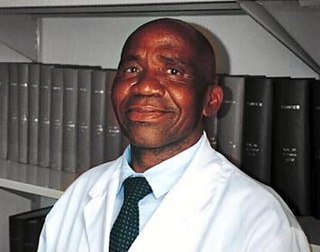
Hamilton Naki was a laboratory assistant to cardiac surgeon Christiaan Barnard in South Africa. He was recognised for his surgical skills and for his ability to teach medical students and physicians such skills despite not having received a formal medical education, and took a leading role in organ transplant research on animals.
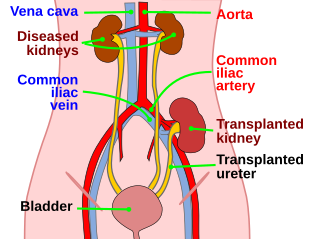
Kidney transplant or renal transplant is the organ transplant of a kidney into a patient with end-stage kidney disease (ESRD). Kidney transplant is typically classified as deceased-donor or living-donor transplantation depending on the source of the donor organ. Living-donor kidney transplants are further characterized as genetically related (living-related) or non-related (living-unrelated) transplants, depending on whether a biological relationship exists between the donor and recipient. The first successful kidney transplant was performed in 1954 by a team including Joseph Murray, the recipient's surgeon, and Hartwell Harrison, surgeon for the donor. Murray was awarded a Nobel Prize in Physiology or Medicine in 1990 for this and other work. In 2018, an estimated 95,479 kidney transplants were performed worldwide, 36% of which came from living donors.
Johan Naude is a South African surgeon and urologist. Naude was former president of the South African Urological Association and a pioneering transplant surgeon who worked closely with legendary heart transplant surgeon Christiaan Barnard.

Francis L. Delmonico, MD, FACS is an American surgeon, clinical professor and health expert in the field of transplantation. He serves on numerous committees and is affiliated with various leading organizations and institutions. He is the chief medical officer of the New England Organ Bank (NEOB) and Professor of Surgery, Part-Time at Harvard Medical School in Boston, Massachusetts, where he is emeritus director of renal transplantation. He served as president of The Transplantation Society (TTS) from 2012 to 2014, an international non-profit organization based in Montreal, Canada that works with international transplantation physicians and researchers. He also served as the president of the United Network of Organ Sharing (UNOS) in 2005, which overseas the practice of organ donation and transplantation in the United States. He was appointed and still serves as an advisor to the World Health Organization in matters of organ donation and transplantation. He was appointed by Pope Francis to the Pontifical Academy of Science in 2016. In 2020, he became the recipient of the Medawar Prize of The Transplantation Society.

A heart transplant, or a cardiac transplant, is a surgical transplant procedure performed on patients with end-stage heart failure or severe coronary artery disease when other medical or surgical treatments have failed. As of 2018, the most common procedure is to take a functioning heart, with or without both lungs, from a recently deceased organ donor and implant it into the patient. The patient's own heart is either removed and replaced with the donor heart or, much less commonly, the recipient's diseased heart is left in place to support the donor heart.

The Heart of Cape Town Museum is a museum complex in the Observatory suburb of Cape Town, South Africa. It is in the Groote Schuur Hospital on Main Road. The hospital was founded in 1938 and is famous for being the institution where the first human heart transplant took place, conducted by University of Cape Town-educated surgeon Christiaan Barnard on the patient Louis Washkansky. The museum opened on December 3, 2007, marking the 40th anniversary of the heart transplant by Christiaan Barnard. The Heart of Cape Town Museum honors everyone who played a major role in a surgical feat that created a new medical era. It also brings attention to ethical and moral implications that came up at the time. It also highlights the ways in which Barnard's accomplishment put South Africa and the University of Cape Town on an international stage.

Sir Terence Alexander Hawthorne English is a South African-born British retired cardiac surgeon. He was consultant cardiothoracic surgeon at Papworth Hospital and Addenbrooke's Hospital, Cambridge, 1973–1995. After starting a career in mining engineering, English switched to medicine and went on to lead the team that performed Britain's first successful heart transplant in August 1979 at Papworth, and soon established it as one of Europe's leading heart–lung transplant programmes.
André van der Merwe is a South African urologist. He is currently head of urology at the University of Stellenbosch and an associate professor at Tygerberg Hospital. He is best known for conducting the world's first successful penis transplant in 2014. He also performed the first laparoscopic kidney removal in South Africa.
Dr. Velma Scantlebury GCM also Velma Scantlebury-White is a Barbadian-born American transplant surgeon. She was the first Black woman transplant surgeon in the United States. She has received many honors in her career, having been named to both the "Best Doctors in America" and "Top Doctors in America" lists multiple times.

Dorry L. Segev is the head of the Center for Surgical and Transplant Applied Research at NYU Langone Health. Previously he served as the Marjory K. and Thomas Pozefsky Professor of Surgery at Johns Hopkins School of Medicine, professor of epidemiology at Johns Hopkins Bloomberg School of Public Health, and associate vice chair of the Department of Surgery at Johns Hopkins Hospital. He has made significant contributions to the field of transplantation, including developing a mathematical model to facilitate a nationwide kidney paired donation program, both in the US and Canada. He is also known for his role in getting the HIV Organ Policy Equity Act signed into law.
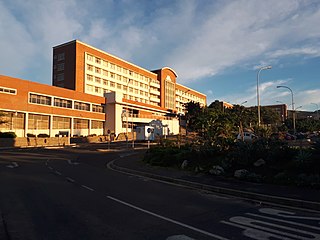
Karl Bremer Hospital is a district general hospital, situated in Bellville, Western Cape, South Africa. It was opened in 1956 with one ward. It was originally an academic hospital for medical students of Stellenbosch University and was utilised for this purpose until 1976, after which it changed to a hospital catering for private patients.

Bruno Reichart is a retired German cardiothoracic surgeon who performed Germany's first successful heart transplant in 1981 and its first combined heart–lung transplant in 1983.
Clive O. Callender is an American surgeon and professor of surgery at Howard University College of Medicine in Washington, D.C. Trained in organ transplantation, he founded the Howard University Hospital Transplant Center in 1974. To increase the frequency of organ donation among African Americans he founded the National Minority Organ Tissue Transplant Education Program (MOTTEP) in 1991. During the 2019/20 academic year he continued his academic work as Professor of Surgery at Howard University College of Medicine.
Lynette Ann DennyGCOB FRCOG was a South African gynaecologic oncologist who specialised in the prevention of cervical cancer in low-resource settings. She worked at the University of Cape Town throughout her career.












